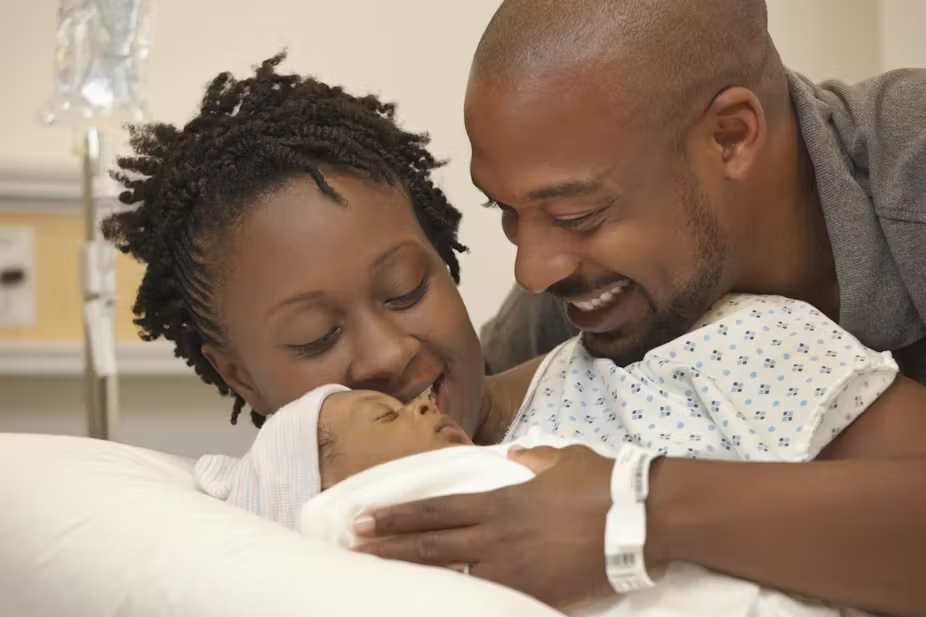Maternal and newborn health is mostly considered a women’s field, and thus, over the course of history, men have largely remained spectators on this wonderful trip. This may have been so largely because of culturally codified barriers and stereotypes. Several studies, however, indicate that male involvement significantly contributes to improved health conditions and outcomes for mothers and babies. This is crucial in a country like Nigeria, which is one of the world’s highest contributors to maternal and neonatal mortality.
A 2018 study conducted by the World Health Organisation’s Division on Maternal Health suggests that, “A supportive partner during pregnancy and childbirth can lower the risk of maternal complications and increase access to critical healthcare services.” The study showed that in Nigeria, where only 43 per cent of women attend the recommended four or more antenatal care visits and the rate of skilled birth attendance is only 39.4 per cent, male involvement increases the likelihood of women attending prenatal care and delivery by a skilled birth attendant. In addition, the 2018 NDHS highlights that contraception use is higher among couples who demonstrate joint fertility attitudes than among those who report decisions made solely by the husband or wife.
However, irrespective of the advantages, male involvement is hindered by complex barriers such as stigma, and the assumption that these are women’s exclusive responsibilities. There’s also ignorance, characterised by a lack of reproductive health knowledge, that sustains the myth that men are disengaged. In addition, logistics barriers, such as long working hours, make MNH unattainable for them.
Dismantling these barriers will require a multi-pronged approach that should include community-based strategies such as peer-to-peer network support, community sensitisation, awareness campaigns, and active engagement with traditional and religious leaders calling out and transforming harmful gender norms into healthy masculinity.
- Obazee advises lawmakers to address corruption, waste in govt businesses
- Declining enrolment in NCE programmes threatens COEs’ sustainability – NCCE
Male involvement in MNH is not limited to improving health outcomes but stands as a strong force to support gender equity. When men are involved in reproductive health decisions, women receive the benefits of mutual respect, shared responsibility, and home equity.
As men become more knowledgeable about what their partners require during pregnancy and child delivery, there is a level of enlightenment and appreciation about how challenging and needing their partners can be, and hence they become more sensitive to their women’s needs.
Male involvement in MNH does not only benefit the mother; it is also instrumental in promoting good health for the rest of the family. Moreover, it has been observed that the presence and involvement of men from the onset enable increased bonding and strengthen the relationship between the father and the child. A 2013 study by Redshaw and Henderson found that fathers who are fully present during childbirth and actively participate in their child’s life from the start are more likely to promote optimal attachment and demonstrate more parent activity throughout their child’s development.
The challenges accompanying the pregnancy and childbirth course are very distinctive, but if there is a supportive partnership, the burden can be shifted from the shoulders to make the transition easier. Husbands’ involvement during pregnancy and childbirth can lighten the burden if they partake in the decision-making process, pool financial resources for care, and offer essential emotional and practical assistance to their wives.
In a country like Nigeria, where financial constraints often delay the start of care-seeking, involving husbands will increase household resources, enabling maternal health expenses. For example, they could accompany the wife to the antenatal visits to enable them to understand their spouse’s condition, issues that could arise, preparedness levels, and the required amount of money. In doing so, they are better positioned to make informed choices, both for the interests of the mother and the baby.
In recent years, attempts have been made to consider men as a significant asset in MNH, and some measures have already been taken to include them in maternal education. For example, in Gombe State, the “Husband’s School” has involved men, where the programme takes them through the pregnancy process to postpartum. The school operates within a group session where they learn about pregnancy, birth preparedness, and a positive masculinity culture.
According to Oduenyi et al., “Healthcare workers can also play a vital role as an active enabling environment in MNH by prioritising men’s active involvement in antenatal visits.” Through active involvement during discussions, addressing their concerns, and the provision of relevant information, the environment can be supportive.
Government MNH policies and programmes should therefore include relevant approaches to institutionalise and broaden male engagement in the sector. Our National Strategic Health Development Plan (2018–2022) recognises this need. The plan requires approaches to be developed to build men’s capacity for reproductive health and joint decision-making. Nevertheless, much greater investment will be necessary to implement or scale up effective interventions nationwide and strengthen healthcare worker capacity on this.
Yet opportunities exist to turn the tide. The growing resonance of women’s empowerment catalyzes discussions debunking regressive gender norms. The proliferation of mobile technologies allows for innovative ways to deliver maternal health education to men. Involving traditional and religious leaders to promote positive masculinity can also prove to be an effective strategy.
The evidence is clear; male involvement is a critical but underutilised strategy to improve maternal and newborn health outcomes in Nigeria. It is time to decisively challenge entrenched norms and cultural mindsets that have excluded men from this crucial process. We therefore call on all stakeholders to prioritise removing obstacles to male participation in maternal and newborn health. Through comprehensive interventions spanning policy reforms, health worker training, community mobilisation, and gender-transformative programming, we can tip the scales towards a greater realisation of men’s roles as supportive partners and caregivers.
Dr Halimah Sanda can be reached at [email protected].

 Join Daily Trust WhatsApp Community For Quick Access To News and Happenings Around You.
Join Daily Trust WhatsApp Community For Quick Access To News and Happenings Around You.


